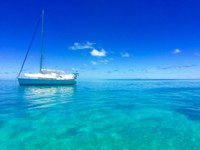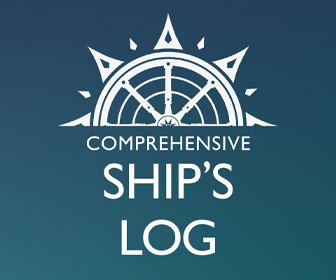The Maldives: A wonderful cruising destination but careful planning required
A personal report of a two-month transit through the Maldives.
Published 7 years ago, updated 6 years ago
Cruising the Maldives


- Thinking of Dave at anchor off Thulhaadhoo Island, South Maalhosmadulu Atoll
We were in the Maldives March through April and then May 2017. The weather through March and April was hot and sunny with generally little wind and it started changing around mid-May when the South East Monsoons started to form. It became a bit cooler, windier and we then had many days where it was overcast and wet.
The Maldives is a wonderful cruising destination, but like Sri Lanka cruising the Archipelago is not as straight forward as it could be.
Appointing an Agent
You will need to appoint an Agent to handle your Immigration, Quarantine, Customs and Port formalities. Choose your Agent very carefully as you cannot change Agencies once your appointment is made. If your relationship with your Agent breaks down or your Agent goes out of business, as recently happened, you can find yourself in a lot of bothers. It has happened.
Our Agency was Shipcare Maldives and they were excellent (info@shipcaremaldives.com).
We emailed Shipcare and a dozen or so listed agents before leaving Galle in Sri Lanka. Shipcare came back to us with the most comprehensive list of fees and charges that would be applied. They outlined well the services they offered and how they could assist us. Afrah and Ismail explain all the charges with you and most are Government charges so are not negotiable. There was recently an attempt by the Government to levy an extra very substantial Anchorage charge for yachts, but the Agents grouped together and convinced the Government to change its mind.
The importance of choosing a good Agent really needs to be stressed as there are some who don’t have good reputations and you simply are not permitted to change Agents. The Recent inaugural Sail Maldives Rally is a case in study, where we were told the Agent got into financial trouble and many yachts reportedly were forced to leave the country without proper clearances.
Clearing into the Maldives at Gan
If you intend just stopping at the southern port of Gan to refuel and re-provision on your way south through the Indian Ocean, Shipcare put us in the hands of another agent Masood, to do our exit from the Maldives. Masood, who is based in Gan, is also very efficient and helpful and can be contacted at marine@mnsmaldives.com.
Clearing into the Maldives at Male
We arrived in Male at 2230 hours and within two hours of arriving Afrah and Ismail (from our Agency) had got a launch and were out on our yacht starting the formalities, which were then completed the following morning. In fact, over our three months cruising the Maldives, we became very good friends with Afrah and Ismail, who are the two principles of Shipcare Maldives. We met all their family and were treated with great courtesy and respect. They went out of their way to help us with all our needs and our paperwork was done in a perfunctory and efficient manner. I can’t recommend them highly enough, based on our experience.
There are numerous charges levied when you cruise the Maldives (see the bottom of the report for details of the fees we paid) and many have to be paid up front, but the longer you stay the lower the cost becomes per day. In all, we stayed just under our 90-day visa allowance.
Anchoring in Male
Male, the capital, is a bustling metropolis with high-rise buildings and narrow busy and crowded streets. It is a fascinating place. Yachts and another visiting craft anchor in the man-made harbor in Hulhumale off the island nearby. They are currently building a causeway bridge between the two islands and until that opens connections are done by ferry. The International Airport is also on Hulhumale.
The harbor at Hulhumale has a Marina-Hotel Complex under construction, but work currently in mid-2017 seems to have stopped due to political differences between some of the parties involved. It is slated for completion in 2018, but it seems far off that state now.
The anchorage at Hulhumale for yachts and Safari Boats is large, crowded and well protected with good holding. You need to leave wide passage near the shore for the large barges bringing in rock and sand to expand the island, so take your fall back line of the yachts and Safari Boats already anchored or you’ll be abruptly awoken by a horn and searchlight in the middle of the night as the barges come through. Most of the Safari Boats lay out three anchors, so it tells you that at times they get very strong winds. It is an interesting experience watching them do it. In the time our yacht was anchored at Rashdoo, an island on an Atoll nearby, we recorded winds over 40 knots.
If/when the Marina construction starts again in earnest, there will likely be a shortage of space in the anchorage during construction. We left our dinghy at the Northern wharf whenever we went ashore, where we tied it between the wharf and a stern line to the sea wall. This kept it out of harm’s way and it was not interfered with at any time.
Exploring the Maldives
You need to get a cruising permit from your Agent to cruise the Atolls. You provide your itinerary and they include the Atolls you want to visit on the permit. It lasts one month and needs to be renewed by your Agent each time. Shipcare basically put all the Atolls on our Permit to give us maximum flexibility, however I don’t really know if they did this as a favour to us or if it is standard practice by all Agents.
Once you have your Permit you are free to cruise until it is due for renewal, when you will need to visit your Agent or a Sub Agent they nominate to handle your yacht in another part of the Archipelago to pick up the renewal. It should be on your yacht at all times, though we were never boarded to have our papers inspected out in the Atolls.
The Maldives are a literal paradise for a cruising ground and the people are generous, friendly and welcoming. We were invited to homes for meals, beach BBQ’s, taken fishing, snorkelling and shown around the islands on a number of occasions.
There are literally hundreds of resorts in the Archipelago catering mainly to the high-end tourist market and generally these resorts do not welcome Yachties unless they intend to stay over as guests. Some offer Day Passes, where you pay to use the resort facilities, meals, drinks, swimming etc, but they generally don’t allow you to anchor overnight. If you get to know a local contact, sometimes they can ease these restrictions a bit for you, but generally they don’t want yachts cluttering up their pristine Lagoons.
One exception to this that we found was Reethi Beach Resort on Baa Atoll. The resort is an Eco Friendly Resort and they welcome Yachties warmly and allow you to anchor there overnight. Reethi’s is worth a visit if you feel the need for a bit of pampering and indulgence and the costs to visitors are very reasonable. As in most circumstances it pays to call ahead and Reethis can be contacted on +960 660 2626.
We have the latest Navionics charts and we found them at times missing vital information; sand bars, reefs and even islands. We also used Google Earth and found on a few occasions that passages were not clear. Paper Charts are really only good for an overview. Navigation within the Atolls themselves should only be undertaken, without local knowledge onboard, during daylight hours. Don’t leave your entry into lagoons for anchoring until late in the afternoon when there is a lot of glare on the water surface. The fishermen know these waters very well and they cruise easily at night, but they aren’t in keelboats and they know the waters like their own back yards.
Obtaining Fuel
We took on Diesel and Petrol for the outboard in Hulhumale and Gan. There are three fuelling barges usually rafted together in Hulhumale and you can either have your Agent arrange the delivery or you can approach them directly to deliver. We found their fuel to be of very good quality with no water or residue in the Baja Filter after filling. The cost varied a few cents each time, but we got it on average at about $0.70 – $0.75 USD a litre. In Gan the Agent arranged for us to go into the Harbour and tie up alongside the seawall, where a Road Tanker delivered to us. It was more expensive in Gan, closer to $1.00 USD a litre. I’m not sure where else you can get fuel, but most of the islands don’t have Fuel Stations or Fuel Wharves. It didn’t cause us any difficulty arranging a visit to Hulhumale to refuel. There are other suppliers in Hulhumale from what we were told, but there had been some problems with their fuel in the past.
Obtaining Water
I have no details about water as we have a Watermaker, however our Agents Shipcare did tell us they can arrange a delivery if we needed it in Hulhumale. Can’t comment on getting it out on the islands though. I believe you would have to check with your Agent and do the “Jerry Can” run in the dinghy if you needed water.
Obtaining Cooking Gas
We carry two 9kg and one 5.2kg LPG bottles with Australian/New Zealand standard fittings, so we had plenty of gas for the time we were actually in the Maldives. However, we did refill before leaving Hulhumale the last time. Your Agent can arrange for your bottles to be picked up, refilled and returned, which takes about four days reportedly. This is how the locals do it from their islands apparently. Alternatively, you can take your tanks to the industrial island of Thulafushi near Male via ferry, and have them refilled whilst you wait. It ends up taking almost a day to get it done and back to the yacht in Hulhumale, but that is shorter than four days. We found the price to be quite reasonable at 200 Rufiyaa for 10kg or about $12.85 USD.
WiFi / Internet
This was the surprise packet. The Internet is excellent throughout the islands and you have covered most of the time even when cruising. It drops out a bit in the southern islands as the Atolls are a bit further apart. But it is very good coverage and we used Google Maps Live a lot of the time. There are two suppliers and many data plans and we didn’t find it to be overly expensive.
Medical Care
There is excellent Medical Care available in Hulhumale at the local hospital. One of our crew had an eye infection and was treated in an excellent and very professional manner by a Specialist Doctor. Most of the Islands seemed to have a Clinic as well to treat minor ailments and manage ongoing health conditions for the locals.
Repairs
We had a mechanical issue that required a Mechanic just on the start of Ramadan. This is akin to trying to get help on Christmas Eve for many of us. We were fortunate enough to be put in touch with Uzair who works on the islands around Male. The local Yanmar Agent, who highly endorsed him, referred him to us. Uzair worked late into the night to get our issue sorted and was most reasonable with his charges. You can contact him on +960 791 8057. When he found out we were going to Gan he gave us a lot of information on good eateries and general information about the Atoll.
Importing parts and spares
There were a couple of steep learning experiences for us whilst in the Maldives. We had to import some parts for the yacht from Thailand and China and the process of going through Customs was a literal nightmare. Our first delivery took 12 days to clear customs and we were charged demurrage fees for every day that it wasn’t released. Every time we went to Customs they wanted another form filled or the receipt from the supplier for payment rewritten, to show more clearly what the shipping fees were. In effect they wanted the invoice to reflect the price of every individual item in the shipment whether it was part of a larger component or not. They also needed the freight fees separated out and the invoice to clearly state that it was paid or on credit. We had to go back to the suppliers in Phuket and China several times to get this laid out to Custom’s satisfaction.
The second shipment was charged Airport Fees, Demurrage for almost three weeks, Customs Fees and so on. But it wasn’t charged Import Duty in their view. It seems to depend on who is on shift at any given time you visit. There were others experiencing similar issues so we were not alone. My advice would be to import nothing unless absolutely necessary. “Yacht in Transit” seems to mean little in the Maldives.
Alcohol
Secondly, if you like to have a drink then make sure you stock up well before you depart your last port heading for the Maldives. There is no alcohol sold to the locals at all and you can only buy it in Male from the Bond Store or if you visit a resort and would like to have a drink. If you want to buy alcohol for your yacht, you will be charged seemingly reasonable prices for beer, but wine and spirits are expensive. You must have the delivery made to your yacht by a registered Doni and this will cost you $300USD. You cannot collect it from the Bond Store in your dinghy and you are not permitted to take it on land at any time. Make sure you have enough on board for your stay in the Maldives before arriving, as well as for your onward passage when you depart. So long as you declare it on arrival and acknowledge that locals will not be invited on board, given or sold your alcohol, they seemed happy.
All in all our three months in the Maldives were a wonderful experience and we hope to return. Don’t miss it.
Details of Fees Paid
You can leave your yacht in the Maldives for six months (crew, however, can only stay for three months maximum). So Agents tend to quote their fees for six months. The Agent Fee usually is negotiable on a pro-rata basis if the quote is for less than six months. I will give the charges exactly as Shipcare quoted them to us. The Alcohol Licence is needed only if you buy Alcohol in the Maldives.
These costs are from my original quote from Shipcare Maldives. There are other levies that can be applied as well depending on your circumstances; e.g. being a commercial yacht taking paying passengers with you. I also point out that this was entering through Male. Other Ports might have different fees. All fees are in $USD.
Clearance Fees
Entry charge: $3.24
Customs in and out: $130
Clearance in and out, official transport: $120 each time
Clearance inward and outward, paperwork: $150
Immigration sign on and sign off: $45
Sanitation: $65
Health official transport for sanitation: $120
Port state control permit: $13.33
Cruising permit: $324
Cruising permit processing: $50
Government charge for light tax on a sailing yacht: $10 (introduced February 11 2017)
Agency fee: $300 (for 180 days)
Liquor license and processing $110 (required only if you need to buy alcohol. You will also need to pay for the Doni that delivers it to your yacht, which is another $300).
All fees plus 12% GST.
Anchorage Fees
The Anchorage Fee is charged by the Maldives Ports Limited (MPL)
From your arrival date to the 6th day of your stay, anchoring is free of charge.
1. From 07th day to 45th day: $4.83 per day.
2. From 46th day to 90th day: $6.83 per day.
3. From 91st day to remaining all days: $10.83 per day.
As you can see, if you want to cruise the Maldives then short stays are prohibitively expensive.
Everything included (except alcohol, fuel and Import Fees for Yacht Parts) it cost us about $1,700. If you amortize the cost over 90 days it was just under $19 a day.
Mark Emery
SV Thinking of Dave
Related Content
Related to following destinations: Maldives
Related to the following Cruising Resources: Cruising Information




